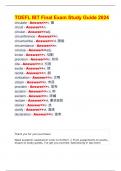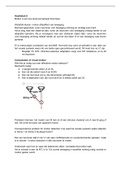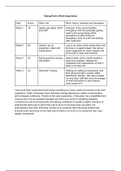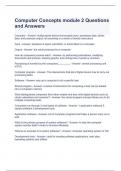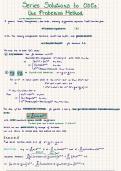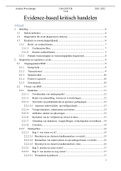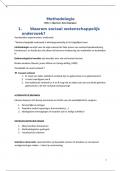Week 1 - introduction ..............................................................................................................................1
Week 2 – issues in modern consumption ...............................................................................................1
Yaish & Katz-Gerro ...........................................................................................................................3
Ritzer ................................................................................................................................................5
Week 3 – consumption’s role in identity creation .................................................................................7
White & Dahl ....................................................................................................................................9
Gosline ........................................................................................................................................... 12
Week 4 – consuming to express community ....................................................................................... 14
Dixon ............................................................................................................................................. 16
Pempek.......................................................................................................................................... 17
Week 5 – consumer culture or culture industry? ................................................................................ 18
Batchelor ....................................................................................................................................... 19
Bagdikian ....................................................................................................................................... 21
Week 6 – choices in commercial offerings........................................................................................... 22
Franssen & Kuipers ........................................................................................................................ 24
Week 7 – the active audiences ............................................................................................................. 25
Tripp & Gregoire ............................................................................................................................ 26
Jenkins ........................................................................................................................................... 28
Shively ........................................................................................................................................... 30
,Lecture Week 1
Lecture Week 2 – issues in modern consumption
Modern consumption
It started with the industrial revolution. People stopped making things by hand and machines
took over what people did. The machine will make it 100 times more fine than a human ever can.
It’s a lot faster, better and cheaper than ever. Instead of having to produce everything yourself,
you could now buy. Instead of working on making a chair for 6 months, you can buy it now in the
store. Demand anything and you can have it within a certain time.In this time you have to buy
things in order to live, no room for making a chair in the big city.
➔ Modern consumer
We consume every day in order to live, commercial consumers.
Now we are dependent, we are not able to make our own chair, food etc.. We trust that there will
be bread to buy. This happens, every single day.
People always have consumed, but modern consumers need consumption. No one will teach you
how to make bread because that will be useless. You can buy what you need, and because you
cannot even make it yourself, you really need to buy it. Modern consumption = we need to buy
things in order to live. People nowadays really have to shop.
Rational choice theory → you will always pick what optimizes your benefits and diminishes your
losses. You pick the things that benefit you the most. Maximize profit, minimize loss.
“Rational action of individuals has a unique attractiveness as the basis for social theory. If an
institution or a social process can be accounted for in terms of the rational action of individuals
then and only then can we say that it has been “explained.” The very concept of rational action is
“understandable.” Social theory can accept the purposive individual as the acting unit.” ~James
Coleman, Foundations of Social Theory
But rational choice theory doesn’t explain it all (buying things you will never wear).
Status theory → choosing things is based on social phenomena, it is socially constructed.
Weber & Bureaucracy
If you are shopping to live, you need a rational society.
What’s so great about bureaucracy? This is becoming more and more important:
• Offers speed, precision, continuity (speeding ticket, sending money vs. going to court and
having a range of possible punishments)
• Works “objectively,” according to “calculable rules”
• Fits democratized society where differences are levelled (if you put in the effort, you will be
rewarded)
• Can help capitalist interests – but it is a tool that can be used for many purposes (when
there is a division of labour, you are in a bureaucracy).
“The decisive reason for the advance of bureaucratic organization has always been its purely
technical superiority over any other form of organization.” ~ Max Weber
Bureaucracy can become its own worst enemy. Irrationality within the bureaucracy is that you
have to deal with differences because everyone is different.
1
,“A society characterized by rationality is one which emphasizes…” ~ George Ritzer
Rationality has become a value system, an ideal by which we judge other people and their
productivity, yourself, etc. It’s almost become a religion.
Ritzer: there are 5 particular things that are important in a society:
1. Predictability – you expect that a hamburger in Rotterdam’s MacDonald’s will taste the
same as one in Germany. If it is different, it is wrong.
2. Efficiency – we expect calculability and efficiency. We expect our food to arrive in certain
time in a restaurant, while you could not make the dish in the same time (or maybe not at
all).
3. Control over uncertainty – we want to control things, we want to know that we are going to
survive this winter even though we cannot do anything ourselves.
4. Calculability – or quantity rather than quality. The value of a MacDonald’s meal is not the
value of quality but quantity, the meal is cheap.
5. Substitution of non-human – going to the bank vs. ATM. The trust in machines is very big
nowadays, we never trust humans.
Rationality is not always the way we consume things (e.g. Apple products). We study
consumption because it is such an incredible force of society. Idea of status, desire and taste.
Need vs. want.
• Google mission statement - Google’s mission is to organize the world’s information and
make it universally accessible and useful
• Dictionary: Hard words, spelling - Before, there was no need to organize.. Example of
William Shakespeare name spelling. Spelling is modern social phenomenon, wanting it to
be precise and organizable.
• Consumption isn’t always about buying things you need. The kid wants the IPod instead
of a knockoff, because of the brand. Taste as a social phenomenon. We don’t need to
shop, we like to shop.. shopping releases dopamine.
Weber - Economic capital is not the only type of capital that people use.
The big 4 types of capital Weber uses:
1. Physical capital – ballet dancers, body builders, attractive people. There is something
about their body that gives them a reward.
2. Economic capital - money
3. Social capital – at a job interview: my uncle worked here, my uncle is your boss, people
you know.
4. Cultural capital – things you like to do (prestige, status)
Bourdieu – show a mechanism between cultural capital and getting more out of life.
Yeishi text: People talking a lot about cultural capital are different from people who do a lot
about their cultural capital.
Their findings:
• Taste comes from habitus (cultural disposition).
• The educational system rewards parents who take their kids to cultural events, e.g Tim
and Tom
→ Reproductive systems, cultural capital as mechanism.
2
, Disentangling ‘cultural capital’: the consequences of cultural and economic resources for
taste and participation – Meir Yaish & Tally Katz-Gerro.
Research question: tastes and participation are two different aspects of cultural capital, so to
what extent does cultural taste antecede cultural participation and in what way do the
determinants of tastes and participation differ?
Data and methodology: Provide a theoretical framework while doing a quantitative telephone
survey using a sample of the Israeli Jewish population (n=1005) and ask them about their
preferences and participation, education and the education of their parents. So representative
for people from Israel. Not really generalizable to western culture. We need to be careful with
what it actually says.
In this text they state that participation is constrained to a larger degree by financial resources
than by tastes and to a lesser degree by cultural resources. But also, tastes are shaped to a
greater degree than participation by socialization processes and through the habitus and, to a
lesser degree, by financial resources. So in their research they find that: cultural participation is
constrained by tastes and economic resources, while tastes are constrained by cultural
resources but not by income.
Two dominant measures of cultural capital in research on cultural consumption:
1. Cultural tastes – represent preferences
2. Cultural participation – represents behaviour
Cultural capital is used to maintain class domination and to shape individual’s life chances. The
process by which individuals classify cultural preferences, hence themselves, implies that
cultural preferences must be related to hierarchical social structures. The habitus a key
mechanism in this process.
Three main categories in which preference and behaviour were employed in research on
cultural consumption:
1. Studies that used either cultural tastes or cultural participation as interchangeable
indicators of embodied cultural capital
2. Studies that used taste and participation in tandem as indicators of embodied cultural
capital without expecting them to perform differently
3. Favour treating taste and participation as two distinct dimensions of cultural capital
Two views have emerged from the distinction between tastes and participation:
1. Argues in favour of using taste, claiming that it represents a category of engagement that
is more refined than participation.
2. Favours using cultural participation for two main reasons:
1. Cultural participation is a public manifestation of social boundaries, which
‘makes visible categories of culture’ and contributes to their stability.
2. Participation is a form of social action that signals commitment, while taste is
merely a statement.
Peterson (most enthusiastic advocate of taste over participation) argues that taste is a direct
measure of cultural self-construction, while cultural activities are filtered through the
availability of arts.
Cultural choices are more closely related than tastes to the concept of lifestyle. Bourdieu sees the
habitus as a set of rules, values, and dispositions, representing principles of regulated
3



